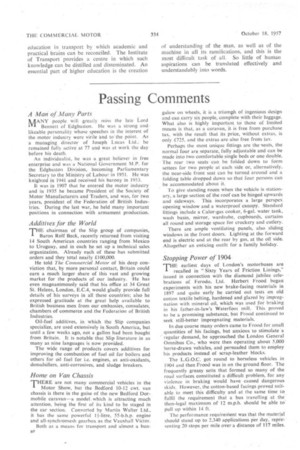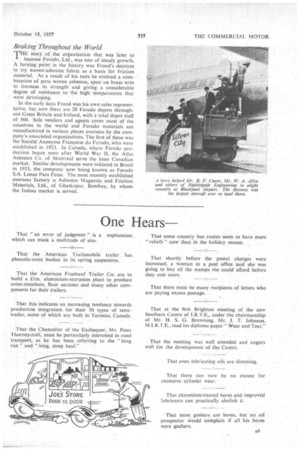Passing Comments
Page 42

Page 43

If you've noticed an error in this article please click here to report it so we can fix it.
A Man. of: Many Parts MANY people will greatly miss the late Lord Bennett of Edgbaston. He was a strong and likeable personality whose speeches in the interest of the motor industry were virile and to'the point. As a managing director of Joseph Lucas Ltd., he remained fully active at 77 and was at work the day before his death.
An individualist, he was a great believer in free enterprise and was a National Government M.P. for the Edgbaston Division, becoming Parliamentary Secretary to the Ministry of Labour in 1951. He was knighted in 1941 and received his barony in 1953.
It was in 1907 that he entered the motor industry and in 1935 he became President of the Society of Motor Manufacturers and Traders, and was, for two years, president of the Federation of British Industries. During the last war, he held many important positions in connection with armament production.
Additives for the World
THE chairman of the Slip group of companies,
Baron Rolf Beck, recently returned from visiting 14 South American countries ranging from Mexico to Uruguay, and in each he set up a technical sales, organization. Already each of these has submitted orders and they total nearly £100,000.
He told The Commercial Motor of his deep conviction that, by more personal contact, Britain could earn a much larger share of this vast and growing market for the products of our industry. He has even magnanimously said that his office at 34 Great St. Helens, London, E.C.4, would gladly provide full details of his surveys in all these countries; also he expressed gratitude at the great help available to British business men from our embassies, consulates, chambers of commerce and the Federation of British Industries.
Oil-fuel additives, in which the Slip companies specialize, are used extensively in South America, but until a few weeks ago, not a gallon had been bought from Britain. It is notable that Slip literature in as many as nine languages is now provided.
The wide range of products covers additives for improving the combustion of fuel oil for boilers and others for oil fuel for i.e. engines, as anti-oxidants, demulsifiers, anti-corrosives, and sludge breakers.
Home on Van Chassis
THERE are not many commercial vehicles in the Motor Show, but the Bedford 10-12 cwt. van chassis is there in the guise of the new Bedford Dormobile caravan—a model which is attracting much attention, being the first of its kind to be staged in the car section. Converted by Martin Walter Ltd., it has the same powerful 14-litre, 55-b.h.p. engine and all-synchromesh gearbox as the Vauxhall Victor. Both as a means for transport and almost a bun
galow on wheels, it is a triumph of ingenious design and can carry six people, complete with their luggage. What also is highly important to those of limited means is that, as a caravan, it is free from purchase tax, with the result that its price, without extras, is only £725, and the extras are also free from tax.
Perhaps the most unique fittings are the .seats, the normal four are separate, fully adjustable and can be made into two comfortable single beds or one double. The rear two seats can be folded down to form settees for two people at each side or, alternatively, the near-side front seat can be turned around and a folding table dropped down so that four persons can be accommodated about it.
To give standing room when the vehicle is stationary, a large section of the roof can be hinged upwards and sideways. This incorporates a large perspex opening window and a waterproof canopy. Standard fittings include a Calor-gas cooker, 6-gal. water tank, wash basin, mirror, wardrobe, cupboards. curtains all round and storage space for crockery and cutlery.
There are ample ventilating panels, also sliding windows in the front doors. Lighting at the forward end is electric and at the rear by gas, at the oil side. Altogether an enticing outfit for a family holiday.
Stopping Power of 1904
THE earliest days of London's motorbuses are recalled in "Sixty Years of Friction Linings," issued in connection with the diamond jubilee celebrations of Ferodo, Ltd. Herbert Frood began experiments with his new brake-facing materials in 1897 and quite early he carried out tests on old cotton textile belting, hardened and glazed by impregnation with mineral oil, which was used for braking in his father-in-law's Waterfoot mill. This proved to be a promising substance, but Frood continued to seek still-better impregnating materials.
In due course many orders came to Frood for small quantities of his facings, but anxious to stimulate 'a regular demand, he approached the London General Omnibus Co., who were then operating about 5.000 horse-drawn vehicles, and persuaded them to employ his products instead of scrap-leather blocks.
The L.G.O.C. got round to horseless vehicles in 1904 and then Frood was in on the ground floor. The frequently greasy setts that formed so many of the road surfaces constituted a difficult problem, for any violence in braking would have caused dangerous skids. However, the cotton-based facings proved suitable to meet this difficulty and at the same time to fulfil the requirement that a bus travelling at the then-legal maximum of 12 m.p.h. should be able to pull up within 14 ft.
The performance requirement was that the material should stand up to 2,340 applications per day, representing 20 stops per mile over a distance of 117 miles.
Braking Throughout the World
THE story of the organization that was later to
become Ferodo, Ltd., was one of steady growth. A turning point in the history was Frood's decision to try Woven-asbestos fabric as a basis for friction material. As a result of his tests he evolved a combination of pure woven asbestos, spun on brass wire to increase its strength and giving a considerable degree of resistance to the high temperatures that were developing.
In the early days Frood was his own sales representative, but now there are 20 Ferodo depots throughout Great Britain and Ireland, with a total depot staff of 360. Sole vendors and agents cover most of the countries in the world and Ferodo materials are manufactured in various places overseas by the company's associated organizations. The first of these was the Societd Anonyme Francaise du Fcroclo, who were established in 1923. In Canada, where Ferodo production began soon after World War H. the Atlas Asbestos Co. of Montreal serve the keen Canadian market. Similar developments were initiated in Brazil in 1953, the company now being known as Ferodo S.A. Lonas Para Feios. The most recently established overseas factory is Asbestos Magnesia and Friction Materials, Ltd., of Ghatkopar, Bombay, by whom the Indian market is served.




















































































































